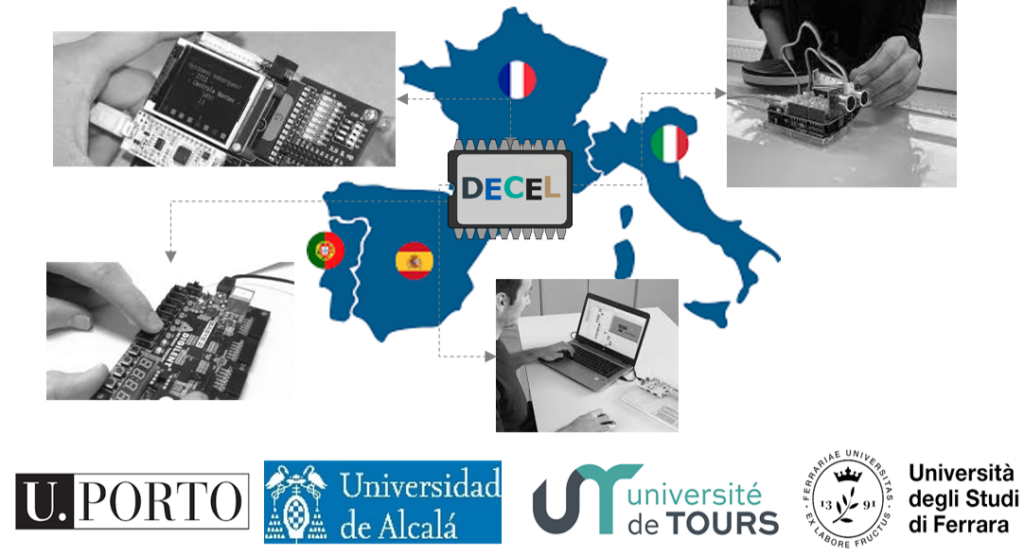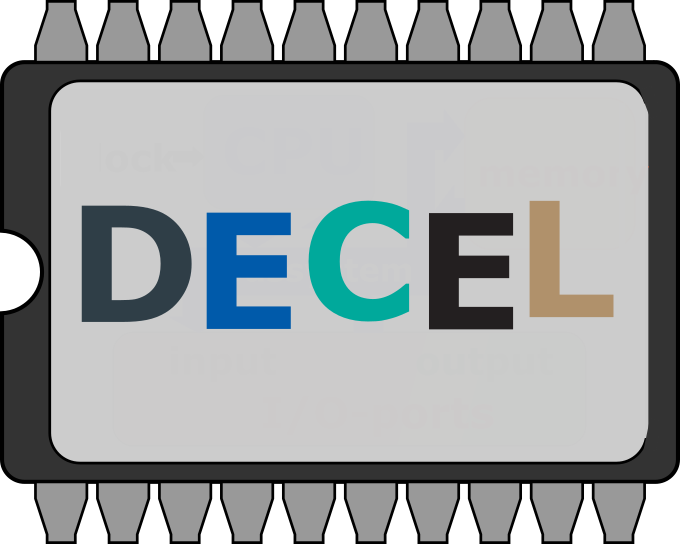
………………………………………….
Project description
Overview
Digital Electronics Collaborative Enhanced Learning (DECEL) Project is a multi-partners ERASMUS+ project (KA220-HED) developing novel pedagogical tools applied to Digital Electronics courses. DECEL aims to propose improvements from several pillars:
a) Enhancing teaching activity through novel pedagogical tools applied to Digital Electronics.
b) Applying new teaching methods to internationalize our courses (e.g. using Collaborative Online International Learning (COIL)).
c) Creating Open Educational Resources related to the involved domains.
d) Developing Real Remote Labs for a massive use of hw resources.
Disclaimer
This project has been funded with support from the European Commission.
This website reflects the views only of the authors, and the Commission cannot be held responsible for any use which may be made of the information contained therein.
Funders
The DECEL (Digital Electronics Collaborative Enhanced Learning) Project started the March 1st of 2022 and it is funded by ERASMUS+ and Spanish government.
Partners

Four Universities are involved in the project:
- Project Leader: Universidad de Alcalá (UAH) Madrid – Contact: @
- Universidade do Porto – Contact: @
- Università degli studi di Ferrara – Contact: @
- Université de Tours – Contact: @
Outputs
O1: Assessment and establishment of pedagogical tools and methods applied to reconfigurable digital electronics field.
O2: Digital enhancement of Real Remote Labs (RRL).
O3: Open Remote Resources: Definition and implementation of a methodology to share on-line resources.
O4: Design and implement pilot Collaborate On-line Onternational Learning (COIL) virtual exchange projects.
O5: Developing of a common structure model for the implementation of modernized courses.
Objectives
- Including collaborate on-line international learning (COIL) in curricula courses. We would like to promote the student-student interaction from an international perspective. Discovering them that the cooperation with other European colleagues can improve our technical and transversal skills.
- To develop a common scheme of real remote labs for giving access 24/7 to those resources. Enabling the use of labs to any student from any part of the word.
- Development of a common platform to spread the information and resources. Just one hub to concentrate open educational resources (OERs), exporting from other learning management systems (LMS).
- Learning procedures of new pedagogical tools applied to Engineering. We will adapt novel teaching methods to the Engineering field with its features such as the high level of experimentally in these courses (hands-on labs).
- Establishing a framework applied to Digital Electronics Systems for its modernization.
Learning,Training Activities and Events

- Applying novel pedagogical methods and tools to the teaching activity for Digital Electronics Systems
Hosted by: Univ. Porto
Target Group: Professors
Approx. date: Sep’22
Participants: 12
Duration: 3 days
- DECEL innovation fest
Hosted by: Univ. Tours
Target Group: Students
Approx. date: Jul’23
Participants: 20
Duration: 5 days
- Internationalization of DECEL participants through a Digital Electronics Intensive Training
Hosted by: Univ. Ferrara
Target Group: Students
Approx. date: Sep’24
Participants: 20
Duration: 5 days
- Multiplier Event
Hosted by: Univ. Alcala
Target Group: Students
Approx. date: Fev’24
Participants: 40
Duration: 5 days
Outcomes
Output 1
• Preparation of activities
• Guideline Report on best pedagogical tools for teaching digital electronics
• Publications
Deadline: Dec’22
Output 2
• Development and assessment of three pilot real remote laboratories (RRL) for supporting courses on introductory and advanced digital design and micro-processor low level programming.
Deadline: Dec’24
Output 3
• DECEL Moodle Platform
• Open Educational Resources (OER)
• Materials
• Access to remote labs
• Tools for Project Dissemination
Deadline: Sept’24
Output 4
• Development of the course material for COIL and setup of the platform guideline report on the best practice achieved
• An infographic (Image) containing the results of the COIL approach developed in DECEL
• Publication in the major journals related to the teaching Initiatives
Deadline: Sept’24
Output 5
•Handbook for modernization of high experimentally regular courses
Sept’24 (M32)
Summary
Based on the principles of inclusiveness, improvement of the STEM area and use and development of new digital tools, the DECEL project, funded by ERASMUS+ program, proposes the following objectives:
1. Development of new teaching practices among European universities: through the instruments provided by the present call, the need to be in contact with European colleagues in a certain discipline in order to improve teaching experiences is raised as a main objective of this project. The continuous and close knowledge of the way in which similar courses are developed in other universities should allow the improvement of their teaching. In addition, the availability of elements of European collaboration through physical or virtual mobilities will allow the development of new experiences in a practical manner.
2. Improvement of teaching methodologies in Digital Electronic Systems disciplines: The way of teaching in numerous courses of Engineering degrees is currently still based on the traditional methodology in most cases (the professor lectures in class and the student takes notes on the explanation). Recent studies have verified the huge effort that the student must carry out under these methods, the high number of dropouts in many cases and especially, and more worrying, the lack of interest of these students in this area and their employment possibilities in the future. As one of the most demanded by the labor market (its contents are the core of business areas such as telecommunications, industrial automation, defense, IoT, electronic equipment, etc.) students do not acquire correctly or retain the received skills and knowledge once the course is passed. New alternatives such as gaming theory or flipped learning have been evaluated in related disciplines with excellent results. The possibility of implementing these and other techniques requires specific teacher training applied to the discipline under study.
3. Real Remote-Labs: The unavailability of university laboratories during COVID-19 has meant that many students have not been able to experience many theoretical knowledge in a practical way. Within Engineering, this has been much more aggravated due to its highly experimental nature. The lack of foresight in many cases, and in others of knowledge, has not permitted students to use specific hardware devices at home. Therefore, one of the objectives of this project is the development of a methodology to remotely access the hardware equipment of the labs, validated through different pilots within the area of Digital Electronic Systems. All the principles developed will allow to build a new methodology to generate remote laboratories, which can be extended to other disciplines.
4. European collaboration between students and teachers: The possibility of promoting a new type of collaboration between students and teachers from different countries, without the need for physical mobilities, is raised as one of the objectives of this project. Traditionally referred to as COIL, the DECEL project will address within curricular courses the collaboration between European work teams for the development of joint projects which will be evaluated as part of a course. This type of internationalization of universities will allow many students to be in contact with other European colleagues in a distant way. This alternative way of work may be the first step to discover the advantages and benefits that a physical mobility can bring. Many students are reluctant to experience this possibility out of ignorance or disinterest, so these collaborations are intended to encourage students to make in the near future mobilities or experiences with other European colleagues.

